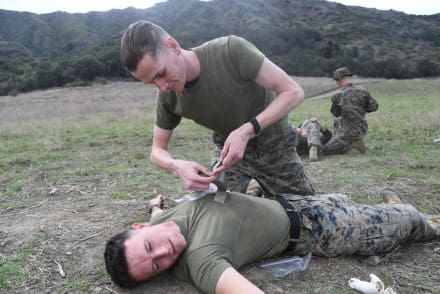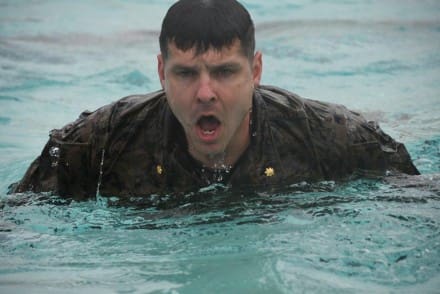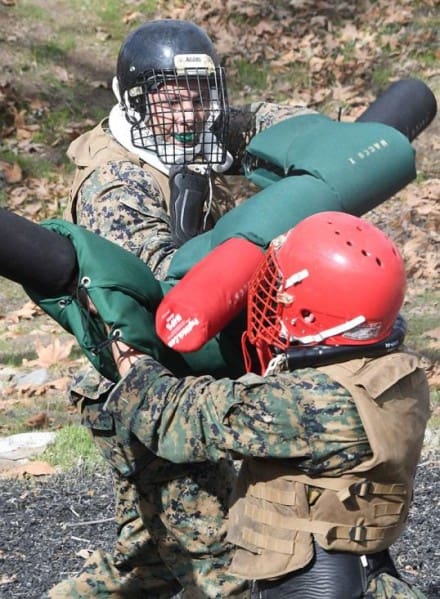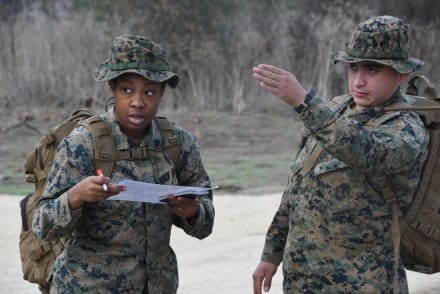By Sky M. Laron, Public Affairs Officer,
Marine Corps Tactical Systems Support Activity
CAMP PENDLETON, Calif.—U.S. Marines with Marine Corps Tactical Systems Support Activity sharpened their combat skills at multiple training locations across Marine Corps Base Camp Pendleton Jan. 19.
“Every Marine is, first and foremost, a rifleman. All other conditions are secondary.” This adage from Gen. Alfred M. Gray, 29th Commandant of the Marine Corps, has come to embody the fighting spirit of the Marine Corps.
“No matter what our occupational specialty is, we are all Marines—we are all warriors,” said Capt. Joshua Lum, MCTSSA Operating Forces Support Group operations officer and training event safety officer.
Lum, an infantry officer by trade, said the primary focus of this training was developing Marines’ mental and physical toughness, which was echoed by fellow event leaders.
“Every Marine at MCTSSA has a duty to the Marine to the left and the right of them, and the basic combat skills that we performed during our event will keep Marines in an always-ready mentality,” said Sgt. Megan Birge, MCTSSA Network Operations Center Telecommunications and Data Systems administrator and training exercise officer-in-charge. “This mentality will ensure Marines are constantly ready for the fight.”
Many of the Marines who fill the ranks at MCTSSA work on satellite antennas, radars, radios and computer systems enabling the technical support required by the operating forces. Yet, these skills are only part of what makes them effective in any battlespace.
Several dozen MCTSSA buddy teams negotiated through five stations that not only tested their physical and mental toughness, but required them to use land navigation, combat lifesaver, radio configuration and combat reporting, aquatic endurance and hand-to-hand combat tactics.
“Marines at MCTSSA are from technical backgrounds or non-combat backgrounds; we had participation from ranks of Private First Class all the way to the Sergeant Major and the XO,” said Birge. “It just goes to show that no matter the [military occupational specialty] or rank, training like this is important and needs to be done across all types of units in the Marine Corps.”
With all the technology and advancements at Marines’ disposal, it is also important to remember the basics, said Birge.
“Overall this was good training,” said Sgt. Spencer Trawick, MCTSSA Network Operations Center network administrator. “In combat, you are going to be doing much more than just your job.”
Trawick, who was raised in the Rocky Mountains of western Montana, added that he was used to hiking and land navigation because he did that type of thing growing up. It was getting his hands on the radios and refreshing his combat lifesaver skills that he found most beneficial, he said.
“Taking a break from the job and getting back to the baseline of what I signed up for was great,” said Trawick.
MCTSSA Marines trained on mountain tops and underwater, and traversed dry creek beds and ravines, putting their combat skills to the test. At the end of the day, these technical experts will go back to their laboratories, raydomes and office spaces to perform the vital task of supporting the operating forces, but their own warrior skills will be front of mind.
MCTSSA, the only elite full-scale laboratory facility operated by the Marine Corps, is a subordinate command of Marine Corps Systems Command. MCTSSA provides test and evaluation, engineering, and deployed technical support for Marine Corps and joint service command, control, computer, communications and intelligence systems throughout all acquisition life-cycle phases.
VIRIN: 180119-M-RY346-1003
Sgt. Spencer Trawick, MCTSSA Network Operations Center network administrator, treats a simulated sucking chest wound at the combat lifesaver station during combat skills training Jan. 19, aboard Marine Corps Base Camp Pendleton, California. (U.S. Marine Corps photo by Sky M. Laron)
VIRIN: 180119-M-RY346-1002
Maj. Clayton MacAloney, MCTSSA Transmissions Engineering branch head, performs aquatic-based physical training or “Pool PT” during combat skills training Jan. 19, aboard Marine Corps Base Camp Pendleton, California. (U.S. Marine Corps photo by Sky M. Laron)
VIRIN: 180119-M-RY346-1004
Staff Sgt. Wendel Matney (left), MCTSSA operations chief, lands a pugil stick strike while sparring during combat skills training Jan. 19, aboard Marine Corps Base Camp Pendleton, California. (U.S. Marine Corps photo by Sky M. Laron)
VIRIN: 180119-M-RY346-1001
Sgt. Tekiera Edwards (left), MCTSSA assistant warehouse chief, and Pfc. Anthony Chavez (right), MCTSSA inventory management specialist, negotiate the land navigation course at the School of Infantry–West during combat skills training Jan. 19, aboard Marine Corps Base Camp Pendleton, California. (U.S. Marine Corps photo by Sky M. Laron)
Tags: Basic Combat Skills Training, Combat Lifesaver, Land Navigation, Marine Corps Systems Command, Marine Corps Tactical Systems Support Activity, Marines, MCSC, MCTSSA, Warrior






That PFC appears to be squaring that SGT away.
Yep, he’s gone full knife hand on her. That’s never a good sign. I’m going with they’ve been lost for awhile.
When you’re an NCO and are relying on the PFC to land nav to the IBJ, you lost before you even started.
You know it’s bad when your marking points on your map, w/o a protractor or a compass.
Not trying to troll… but seriously where did the duck tape chest seal come from. Please stop teaching what ever the duck tape over shirt crazy is…
Who cares about TCCC. Someone needs to take that green belt’s NCO aside and talk to him about enforcing haircut regulations.